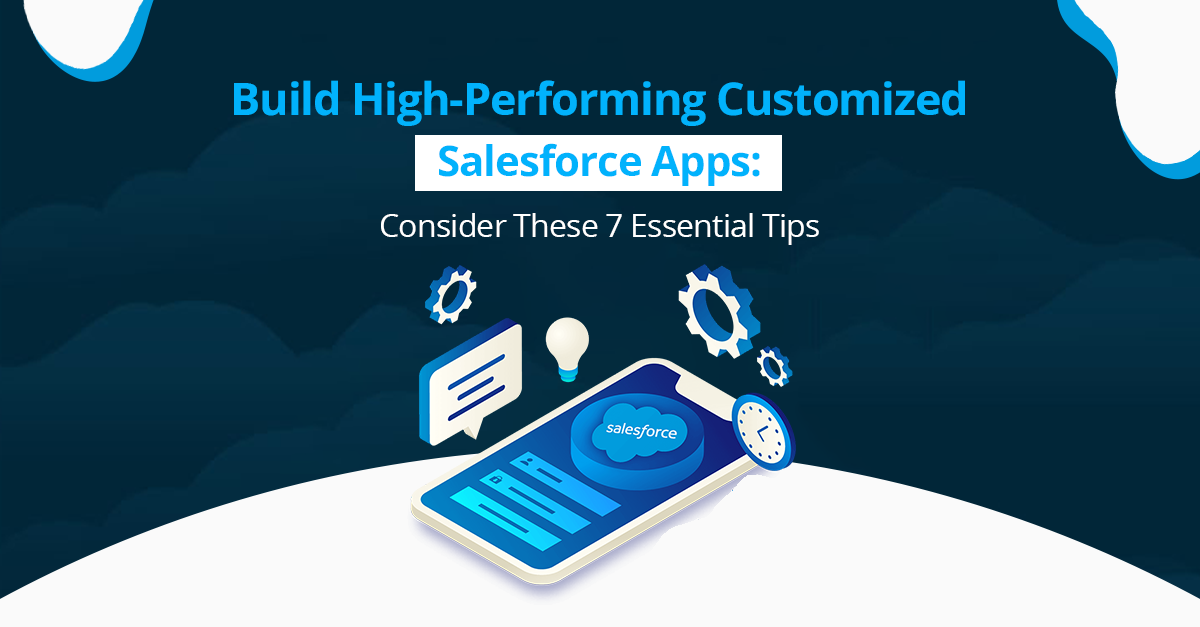Building High-Performing Apps: 7 Essential Salesforce Custom Development Tips
20 Jun 2023
Table of Contents

Managing a business is something that requires excessive attention from stakeholders while needing tools and experts to rely on for the app development process. Whether it is about managing sales, services, or marketing operations, an app should be able to do it all for the business. That’s why companies are considering Salesforce custom development instead of going for standard applications.
Salesforce has proven to be a trusted CRM platform for building business applications. A study showed that users are witnessing up to 50% faster development cycles when using Salesforce for application development. But building such apps isn’t that easy. Every organization requires a team that is capable of handling the entire process and has an understanding of best development practices.
Table of Contents
7 Essential Tips for Salesforce Custom Development
To understand this better, let’s go through some tips that Salesforce development services always follow to build highly functional Salesforce custom applications.
1. Check for existing solutions
Before you plan on building the new Salesforce application, make sure to check and evaluate the existing solution or the Salesforce configuration that you’ve been using. You need to evaluate your challenges with the existing system and how you expect your new solution to be.
You need to check if there are any existing objects that you can use which can help to minimize customization needs. You should also look for any pre-built Lightning Components that could be helpful.
2. Give priority to requirement gathering
When starting with Salesforce custom development, you need to recognize the end results that you expect to have. You might come across different ways to get the same result, so you need to keep your mind open as you might need to change business processes to select the right way to get the custom app.
Also, remember to consider reporting requirements as it is necessary to be focused in the design phase. Many users make the mistake of giving it an afterthought. This is necessary as it may impact your object relationships.
3. Consider security and visibility
Make sure to keep data security at the forefront when building a Salesforce application for your business. When tailoring a custom application, you need to focus on considering object-level, record-level, and field-level security. This is essential to consider, especially in cases when external users would be accessing the app. Also, make sure to test the user-based access before you get your application live.
It is also essential to conduct profile-based testing of dashboards and reports, as different users would get different results on display depending on the different types of security levels. In addition to it, add tabs for objects that you want to set as searchable, simplifying the navigation system of the app.
4. Keep the customization simple
When working on the customization, you might feel like adding every bell and whistle that you find impressive. But that’s not the right approach when it comes to customization. Adding every type of customization would simply make the app heavier, and it might not function as smoothly as you expect it to.
Excessive customization would not just be overwhelming for the application but will also make it more difficult for the team to work on the maintenance, thus increasing the workload in the long run. This is something a Salesforce development company always keeps a check on, ensuring that the customizations are simple and easy to work with.
5. Ensure that the app will integrate with existing systems
It’s not just about the ability to build a customized Salesforce app; you should also be able to integrate the applications with other applications your team has been using to manage operations. To enable it to integrate the app with other third-party applications, you need to take care of different aspects. When you’re re-purposing your standard objects, try to use existing fields wherever you can.
Also, if there are standard objects used in the app, you might have to consider using new record types that will enable you to differentiate new Contacts and Accounts from the standard objects. You should also keep in check that you’re using the convention and naming styles of your organization.
6. Maintain data integrity
Along with taking care of the functionalities that you’ll be adding to Salesforce custom application development, you should also pay enough attention to enforcing data integrity. You need to focus on a few steps that could help you prevent gathering bad data when developing your custom app.
Use default values, validation rules, and workflow field updates to improve your app’s usability. It will also keep your data clean. You can also set Duplicate Rules and Matching Rules to help prevent duplicate records in your app.
7. Keep scaling in mind
When you’ve already decided to build a Salesforce business app, you’d know for sure what will be your target audience and what functionalities you need. But that’s not all. You have to think ahead of time and prepare an app that will work for you as you grow your business. Don’t just focus on your existing expectation.
Your Salesforce app should be scalable and should work for your business efficiently. If you do so, you’ll be ready to work with the app as your strategies grow or change. You don’t have to keep coming back to make changes to the application as you plan on any business growth.
Build an Efficient Customized App with the Best Salesforce Development Company
When you have a business to run, it could be very difficult for you to be completely involved in the planning or development plan of the Salesforce app. This is something that requires proper time and attention. So, while you’re focused on your core business operations, hire Salesforce developers who can take charge of your app development.
With a trusted team, you can always be stress-free about the planning and design phase of the application. But the best part is the developers will keep you involved in the process, keeping the complete plan transparent, and even ask for your input and expectations. Contact us and get such developers onboard and get started to have your custom Salesforce app running.
About the author
Editorial Team – 360 Degree CloudThe Editorial Team at 360 Degree Cloud brings together seasoned marketers, Salesforce specialists, and technology writers who are passionate about simplifying complex ideas into meaningful insights. With deep expertise in Salesforce solutions, B2B SaaS, and digital transformation, the team curates thought leadership content, industry trends, and practical guides that help businesses navigate growth with clarity and confidence. Every piece we publish reflects our commitment to delivering value, fostering innovation, and connecting readers with the evolving Salesforce ecosystem.
Recent Blogs
 Salesforce Clouds
Salesforce Clouds
Top Salesforce Integration Tools & Platforms You Must Consider
Gone are those days when businesses used to rely on one or two systems to manage their operations. In this modern tech ecosystem, businesses use a myriad of…
Read More Salesforce Services
Salesforce Services
Top 10 Salesforce Implementation Partners in 2026 to Drive Scalable Growth
Salesforce generates an annual revenue of $34.86 billion, holds 21.8% of the CRM applications market share and has acquired more than 65 companies to date. From the numbers, it is clear that Salesforce has taken…
Read More Salesforce Services
Salesforce Services
Top Salesforce Consulting Companies in the USA: How to Choose the Right Partner
Do you know 70% of customer Salesforce implementations are conducted by Salesforce consulting partners? This number clearly indicates how important Salesforce consulting firms are for businesses that…
Read MoreReady to Make the Most Out of Your Salesforce Instance?
Our Salesforce aces would be happy to help you. Just drop us a line at contact@360degreecloud.com, and we’ll take it from there!
Subscribe to our newsletter
Stay ahead with expert insights, industry trends, and exclusive resources—delivered straight to your inbox.





